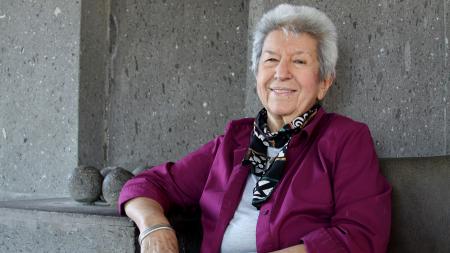Sylvia Molloy (1938-2022), a pioneer in addressing LGBTQ+ cultural issues in her work, builds in her posthumous book, “Animalia”, a series of stories in which she recreates her truncated desire to have pets, during childhood, and the coexistence that she built as an adult with different species through a bond of love, surprise and bewilderment due to the wisdom and healing energy that certain animals treasure.
From that premise, the author of the emblematic novel “En breve jail” -icon of queer literature- and pioneer in approaching autobiography to produce literature blurring the rigidity of genresbuilds in the book, edited by Eterna Cadencia, a work where he talks about mutual dedication, experimentation, and also the unconditional love that animals are capable of.
“It took me a long time, and passing through two countries that were not mine, to realize that to be yourself it is always better to be with another, especially if the other belongs to a different species, that is, if it is totally not one”, reflects in the work, Molloy, who lived in the United States from the 70s, where she taught and became, in 1974, the first woman to obtain a tenured position at Princeton University.
“The strange plays a preponderant role in my writing. I am interested thematically for autobiographical reasons, but I would say that they are not necessarily the most important. I am interested above all in working with an oblique perspective, the point of view of the homosexual who, like the exiled , never feels completely safe, or included,” Molloy had said about his life, work and vision of the world.
Writer, literary critic and essayist, she was the author of other works, such as “El común olvido” (2002) and “Disarticulaciones” (2010). Her last book published in Argentina was “Varia imaginación”, a “fatten version” -as the author called it in dialogue with Télam- of the work that she had already published in 2003 by Beatriz Viterbo and that was considered a classic of the Argentine literature.
In the journey of stories gathered in “Animalia”, the author leaves a record of the evolution of the bond that she forged with different species, from the prohibition of having pets in the family home, where however his mother, “so reluctant to show any feeling that an animal could inspire in her”, sought to feed raw meat to the wombs that came to the garden. She would clip one of her wings from one of them so that she would not take flight with the others.
Lacking typical childhood pets such as dogs and cats, as a child she sought out to play with bugs and rhinoceros beetles that appeared in her backyard, “lining them up and marching them off.” But after her parents objected to her playing with these insects because they considered that “the bugs were disgusting”, she took refuge for a while in reading books related to animal life.
Silkworms occupied, at another time, the place of his concerns. Along with these slow-moving insects with thick physiognomy, he discovered unknown aspects of their nature: “the worms slowly assembled their cocoons, wrapping themselves in them, like someone wrapping themselves in a shroud, the cocoons were of different colors, yellow, pink; the butterflies that emerged, instead a dull, milky gray.”
In other accounts, Molloy evokes the adoption of a dog that ended up giving birth to a cat, to which are added the snapshots who are going through pandemic times where, like humans, living in confinement became tedious and other times the company of various cats becomes a balm, in times when she was already sick with cancer.

“It’s not just any cat. It’s invariably the rogue that for years avoided every human being and that now settles on me, now along my legs, looking forward, like a nocturnal sphinx, now on my chest, staring at me. I know he’s looking at me because once when I turned on the light his eyes surprised me, his grim look, almost over my face, as if they were seeing me for the first time.”
Living with his partner, Geiger, in the United States, appears with stories in which he also flies over the threatening, such as the appearance of a snake in a circle formed by his four cats, during one of his breaks.
In others, Pearly, Ruby and Goldie appear, the chickens that they adopted together with their partner on Long Island, and they joined others baptized with the names of the wives of dead presidents, Eleonor, Jackie, Ladybird, Imelda and Evita, in a game of humanization that characterizes the coexistence between animals and people.
With the death of several of these chickens, “another batch arrived, full of energy, this time they received the names of gay athletes -Martina Navratilova, Renée Richards, Billie Jean King- because they challenged the binary in an exemplary way”. Then, three Polish chicks arrived with a platinum blonde wig instead of a crest, which reminded them of Andy Warhol, for which they called them “the Warhola girls or, sometimes, the Warholitas”, since the artist’s last name was originally Wharhola, says the author in the work.
Between mentions of Borges and other evocations, Molloy rescues Gloria the cat in one of the stories, turned into Glory, a great provider of trophies such as dead rats and dying birds, and in which she realizes the healing power of felines. “When I was recovering from that accident in which I broke my leg, someone told me that cats, or more precisely the purring of cats, helped to weld bones. This opinion, not at all scientific but not necessarily wrong, It was reaffirmed by a friend. I spent two months in the room that overlooked the garden, unable to walk, with my leg raised, rod-shaped, and Glory in my skirt,” she recalls.
The special love for cats is a constant in this book by Molloy, where he reports constant adoptions of cats, among which he remembers Circulita, an almost blind cat, who walked in circles, but surprisingly, never collided with any kind of object.
Among these adoptions, Charly also appears, “a Portuguese water dog, elegant, obedient, with a sense of humor” that one day when he was left alone, but in the company of a cat “ate (out of rage?) half a volume of the memoirs by Lucio Mansilla”.


















